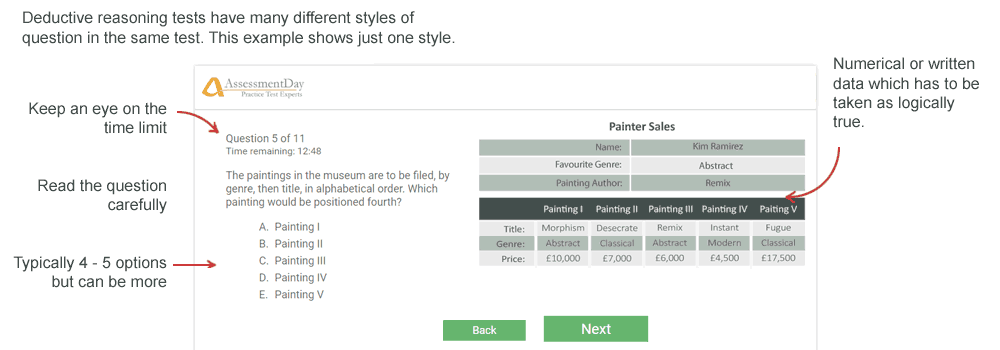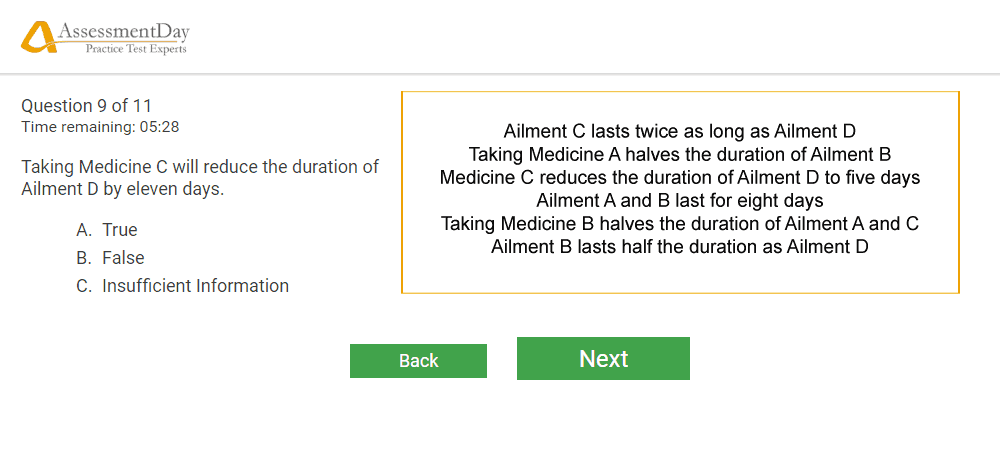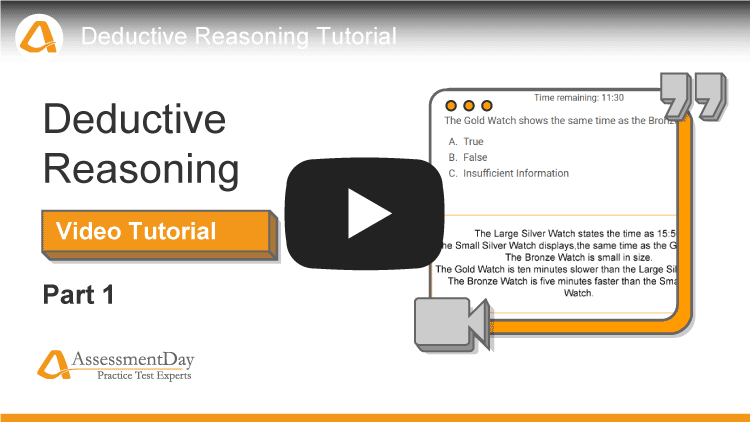Deductive Reasoning Tests
Practice tests, solutions, and tips to help you pass employers' deductive reasoning tests.



Updated:
Deductive reasoning tests in job selection
Have you been invited to take a deductive reasoning as part of a job application? Our practice tests have been written specifically to prepare candidates and let them know what to expect in their real deductive reasoning tests. You should try a test now.
Here are screenshots of our deductive reasoning tests:


Page contents:
Jump to:Looking to hire?
We recommend Test Partnership for companies seeking reliable hiring tests.

Deductive Reasoning Video Tutorial - Part 1
The following video is part 1 of our two part tutorial whereby we guide you through deductive reasoning questions highlighting the things to look out for:

What is deductive reasoning?
A deductive reasoning test assesses your ability to make logical deductions from given information. You are presented with word problems and are asked to choose from multiple answer options, not basing your answers on any previous knowledge outside of the information in the question.
Deductive reasoning tests are used to test the logical deduction problem solving ability of each candidate. You must be able to accurately deduce from several pieces of information what the valid conclusion is.
Accuracy and speed are incredibly important in tests of deductive reasoning, and you'll be scored accordingly. Therefore, it's important that you get the chance to practice in advance in order to improve your ability (it will also help you understand what is required of you).
The most common deductive reasoning tests used by employers
The term deductive reasoning is used only commercially by the test publisher SHL. Other test publishers tend to use other descriptions even though their format may be similar. The best thing to do is contact the employer or company who has invited you to take the test. They are usually very helpful and will likely provide you with at least more information on the nature of the test, or sometimes a few example questions.
- 1. SHL Verify Ability Tests - SHL are the largest test publisher in the UK. Their deductive reasoning tests vary slightly in length depending on level: typically around 22-25 minutes. The format involve a variety of slightly different question styles. The first, will be purely verbal. The premises are a sequence of given sentences. The second, will be image driven. The premises may be slightly more abstract or numerical in nature. The third, is identifying the premises from a block of text. SHL's Verify range of tests have the option of a follow-up test in which the candidate is asked to re-take a shorter version of their first test. This can be used by the assessor to assess consistency and response patterns, and help identify the risk that the original test had not been completed by the candidate in question.
- 2. Kenexa Ability Tests - Kenexa are part of IBM and are also a large test publisher. Their deductive reasoning tests typically consist of 20 questions, where one must follow the logic of statements in order to deduce the correct answer. They are very similar in style to SHL. A typical time limit is 20 minutes for 18 questions, but again, this can vary slightly depending on level of the role.
As well as taking example tests, you should read the advice and findings below on how these tests work and what they measure.
PRO TIP
By taking example deductive reasoning tests you will become familiar with the question format. Luckily for you most employers use a similar format of deductive reasoning test, which means it's easy to get some realistic practice beforehand.
Free practice deductive reasoning tests
Free Deductive Reasoning Test
FreeThis free shortened deductive reasoning test contains 11 questions and has a time limit of 13 minutes.
Deductive Reasoning Test 1
Premium- 22 questions
- 25 mins
Deductive Reasoning Test 2
PremiumDeductive Reasoning Test 3
PremiumDeductive Reasoning Test 4
PremiumHow to improve your deductive reasoning skills
The concept behind deductive reasoning is to test the candidate's logical deduction problem solving ability. By processing the premises given, one has to reach a logically certain conclusion. Deductive reasoning tests are a form of aptitude assessment. These tests are used to assess a broad array of candidates. Deductive reasoning is a highly useful, transferable skill.
Deductive reasoning tests are one type of psychometric test frequently used in selecting applicants for job roles such as engineering and IT. You have to think logically and methodically against the clock to deduce the logically correct conclusion from the given premises. Usually the best way to approach deductive reasoning tests is to spot a certain and unwavering variable. From there, one can pit the other clauses against the variable, and quickly check to see how the information juxtaposes with the next premises. Practice will help.
Key takeaway
As with all aptitude tests, try to work both quickly and accurately. If you are unsure of an answer, you should leave it and come back to it at the end if you have time. Before you sit down for your real deductive reasoning test, try a free sample test below.
The importance of practice
As with most things in life, practice makes perfect. This is certainly the case when it comes to deductive reasoning tests. Being presented with them for the first time can be a bit of a shock, particularly if you haven't done anything specifically related to deductive reasoning in the past, and that in itself can be enough to affect your score. But, if you get the chance to see deductive reasoning tests first you'll be better prepared come test day, and if you practice your deductive reasoning skills you'll have a much better chance of success.
Practising your deductive reasoning really can make all the difference. Skills can always be improved if you spend enough time on them, and if you get a better understanding of what's involved in deductive reasoning tests you'll be much more capable of securing that perfect score.
If you want to get that job it's essential that you show your skills in deductive reasoning to the best of your ability, so why risk it? Make sure to try plenty of practice tests first and you'll be much more confident.
Start practising quality tests with a free account
Practice makes perfect
- Learn from detailed solutions
- Track your progress

Deductive reasoning tests from AssessmentDay
Here at AssessmentDay we know how important deductive reasoning skills can be in the job market, and we also know that practice is a vital part of success. That's why we offer practice tests to anyone that's about to be faced with one for real, allowing you to practice your deductive reasoning skills from the comfort of your own home.
Take note!
Once you've seen the format of deductive reasoning tests and have tried a few out you'll be much better prepared and much more able to succeed in the real thing, so don't thwart your chances of success - be prepared by practising your deductive reasoning skills before you even think about doing it for real, and make sure to come to us for all the deductive reasoning tests you could need.